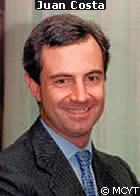Spain to build Europe's most powerful computer
Spain is set to build the world's second most powerful super computer and the most powerful one in Europe, the Spanish Minister for Science and Technology, Juan Costa, has announced. 'It will be the first supercomputer in the world for general use,' the minister told a news conference, explaining that the supercomputer will help cure disease, combat drought and improve industrial design. Alzheimer's disease, BSE and climate change will be among the top priorities for research, largely through simulation and models, added Mr Costa. The system will be at the heart of a new research centre to be located in Catalonia, Spain's high-tech hub, and will cost 70 million euro over four years. Built in conjunction with IBM, it will used Linux software, weigh 60 tonnes, and occupy 120 square meters. Comprising 45,000 processors, it will have the capacity to process 40 trillion calculations per seconds, and will have a memory equivalent to that of 18,000 computers. If completed as planned, it will become the fastest computer in Europe, a record currently held by Germany's Jülich research centre with another IBM computer with a peak performance of 8.9 trillion calculations a second. The fastest computer in the world today is the Earth Simulator, created by NEC in Japan. This computer, which is able to recreate the planet virtually, is dedicated to climate modelling and simulating seismic activity. The new Spanish National Supercomputer centre will also conduct research on aeronautics and mechanical engineering. The Centre will host 4,000 Spanish and international researchers a year, and will be run by an independent scientific board that will decide which projects have priority, explained Mr Costa.
Countries
Spain



